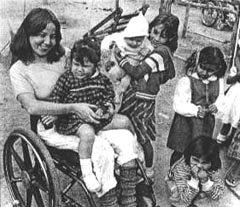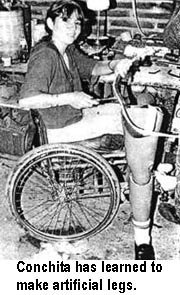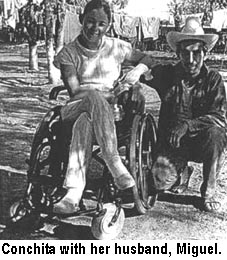| 265
|
CHAPTER 42
Need for Independent Living
and Women's Liberation:
Conchita's Story
The Need for Independence from One's Own Family
In many countries, community based rehabilitation (CBR) has been
promoted with its main focus in the homes of disabled individuals. Each
home is regularly visited by a "local supervisor," who teaches the family
to do rehabilitation activities with the disabled person. In these
programs, often there is little encouragement for community centers - even
if they are run and controlled by disabled persons themselves. The World
Health Organization's guidelines strongly discourage residential centers
where disabled children (or adults) are kept away from their homes for
rehabilitation and skills training.
Certainly there is a good argument for not taking young disabled
children out of their homes and putting them in special boarding schools
or in "institutional care." Usually the best place for a disabled
child, like any child, is her or his own home.
But every rule has its exceptions. Many disabled children
are so over-protected by their parents that they develop little
self-confidence or sense of personal worth. Especially with
teenagers, as long as they stay in their home, they may have a hard time
establishing an identity as self-determined adults. As a result, they may
become despondent, and appear to lack energy or will power. For some of
these youth, a community rehabilitation center - or independent
living center - can help them find their footing and a new sense
of self. This was true for Manolo and Luis, whose story is told in
Chapter 46, as with many young people who
have spent time at PROJIMO. It was especially true for Conchita.
Conchita's Liberation as a Disabled Person and as a Woman
 CONCHITA,
who was extremely dependent, depressed, and even suicidal when she first
came to PROJIMO, has become one of the program's most capable, caring, and
self-reliant leaders. She became paraplegic from a fall as a teenager and
spent 8 years at home after her accident. Her family did everything for
her, and she had little hope of ever becoming independent, holding a job,
or getting married. CONCHITA,
who was extremely dependent, depressed, and even suicidal when she first
came to PROJIMO, has become one of the program's most capable, caring, and
self-reliant leaders. She became paraplegic from a fall as a teenager and
spent 8 years at home after her accident. Her family did everything for
her, and she had little hope of ever becoming independent, holding a job,
or getting married.
When Conchita visited PROJIMO for the first time, she was astounded to
see other disabled persons, including spinal-cord injured young women like
herself, fully self-reliant and performing a wide range of skills and
services. She at once wanted to stay, and had a hard time convincing her
protective parents not to stay there with her.
Eventually, Conchita not only became a highly capable leader and
technician at PROJIMO, she also married, has two lovely daughters, and
manages her own household. |
| 266
|
|

Women's rights. Another one of Conchita's
accomplishments is even more impressive: her liberation from male
dominance in a Mexican village.
When Conchita was first at PROJIMO, she worked with energy and
commitment, giving of herself unselfishly for the well-being of the
disabled kids whose needs she helped to meet. She often spoke of her
coming to PROJIMO as her "return to life." However, acceptance of her
womanhood, with possibilities for love, sex and marriage, took longer.
As she saw other disabled persons at PROJIMO having loving relationships
and getting married, she began to re-examine her feelings and
potentials. A friendship with Miguel, one of the few non-disabled
workers at PROJIMO, gradually became more intimate. The mutual
attraction began to overcome Conchita's doubts and fears. Eventually she
married and moved into a small, lovely home that Miguel built for her. A
year later, she had her first baby, Camelia.
Conchita's husband loves her dearly. But, at first, he treated her
like his personal property. He wanted her to do nothing more with her
life than to be a good housewife. He insisted that she ask his
permission for everything she wanted to do. At the same time, he
expected her to suffer in silence his late nights on the town, his
drinking habits, and his angry temper.

Influenced by the spirit of equality and self-determination at
PROJIMO, in her marriage Conchita was unwilling to settle for the
subservient role that most men expect of their wives in Latin American
(and in much of the world). She began to demand her rights and insist
that her husband treat her as an equal. At first, Conchita's insistence
on equality was very hard for her young husband to accept. But she
persevered and, in time, Miguel lost a lot of his macho stance and began
to treat her with respect. All in all, Miguel has become a more
even-tempered, considerate person. He also drinks less than he used to,
and is a more responsible and loving father.
Helping other women to stand up for their rights.
Conchita and Mari, the two principle leaders of PROJIMO, have both
managed to gain equal standing with their husbands in making decisions
that affect their lives. In addition, they have helped other girls and
young women at PROJIMO to stand up for their personal and sexual rights.
The example they have set has had an impact on the whole village, where
many women are beginning to speak out, and to refuse to accept double
standards from their husbands.
So it is that Conchita has not only emancipated herself by
standing up for her rights, but she has also had a liberating and
equalizing impact on many of the other women in the village.
|
|